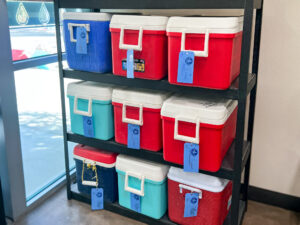Elko (775) 777-9933
Las Vegas (702) 475-8899


 Building upon last quarter’s article on Sample Handling Post Collection, this quarter we’re turning our attention to a key factor in preserving sample integrity: temperature control.
Building upon last quarter’s article on Sample Handling Post Collection, this quarter we’re turning our attention to a key factor in preserving sample integrity: temperature control.
As a certified laboratory, specializing in organic and inorganic testing, our goal is to provide high quality, legally defensible data. WETLAB assumes the responsibility of providing results that are accurate, reliable, reproducible, and valid for compliance monitoring. In order to meet our client and regulatory obligations it is important to understand that a test result is only as good as the sampling and handling that was performed before analysis.
Maintaining proper temperature control is crucial to ensuring the integrity and safety of samples. With the exception of samples for metals analysis, samples must be received by the lab at a temperature of 2° – 6° C (35° – 42° F). From sample collection to storage and transportation, temperature plays a vital role in preserving the quality of specimens and preventing contamination or degradation.
Below are 4 main risks to sample integrity when temperature fluctuates:
- Denaturation: Elevated temperatures can break down proteins, enzymes, and other biomolecules, rendering them inactive or altering their structure.
- Degradation: Temperature changes can accelerate the degradation of organic compounds and other sensitive materials in the sample.
- Altered Physical Properties: Viscosity, density, and other physical characteristics can be affected by temperature variations, potentially impacting analysis. For instance, samples received to the lab frozen can be rejected and not viable to compliance reporting.
- Microbial Activity: Improper temperature control can impact microbial activity. The 2° – 6° C temperature range aims to preserve the population at the time of sampling by inhibiting growth and stabilizing the microbial population.
These risks can be avoided by maintaining appropriate temperature control for samples by utilizing the simple best practices below.
Best Practices to Ensure Temperature Control
-
- Always transport samples in coolers with wet ice or ice packs.
- WETLAB is always happy to supply coolers and ice packs upon request to facilitate your temperature controlled sample transportation.
- WINTER: Keep the sample cooler in the cab of your vehicle to reduce the instance of frozen samples.
- SUMMER: Wet ice is more efficient at cooling samples than ice packs.
- Track the temperature of the samples during transportation and document any deviations to assess the impact on sample quality.
In regions like ours, where seasonal and daily temperature swings are common, it is essential to ensure your sample collection and transport team are educated in best practices and equipped with proper supplies to maintain the samples integrity from collection to delivery at WETLAB. We are here to serve our clients and adhere to analytical methods and environmental regulations specifically targeting sample integrity. We extend our expertise out to you to better prepare our clients for high quality, legally defensible data. If you have any questions about sample handling procedures or need supplies, please don’t hesitate to contact us. We’re committed to helping you obtain high-quality, compliant data every time.
 >
>
